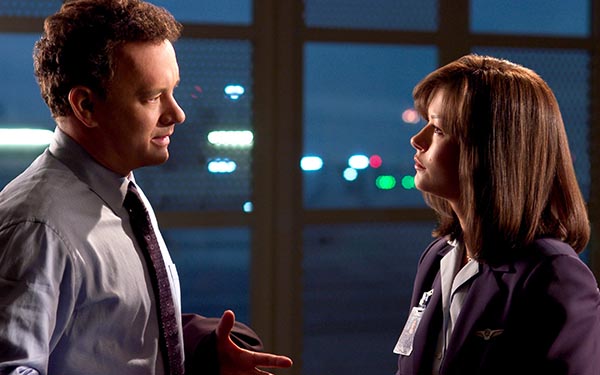Spielberg’s airport-based, slapstick-style The Terminal is cheesy, saccharine, simplistic – and it’s absolutely wonderful.
The Terminal, which stars Tom Hanks (Philadelphia, Castaway) as an Eastern European tourist stranded in JFK airport due to a passport issue, does not rank at the top of Steven Spielberg’s directorial oeuvre. After his heavy historical films of the 90s such as Schindler’s List (1993) and Saving Private Ryan (1998), Spielberg clearly wanted to focus on lighter subject matters, first with the stylish sci-fi Minority Report (2002), then with the smooth crime caper Catch Me If You Can (2002), and finally with The Terminal. Partially inspired by the true story of Mehran Karimi Nasseri’s 18-year stay in an airport, Spielberg’s early 2000s work transcends its undoubted flaws with its heart-warming messages of acceptance and human connection. Spielberg knows exactly what he’s doing here – there is no attempt to make Andrew Niccol (The Truman Show) and Sacha Gervasi’s (November Criminals) sentimental screenplay into anything more than it needs to be – and as a result, The Terminal is fun to watch and, perhaps most impressively, completely and utterly life-affirming.
The Terminal’s success can first be measured by its $220 million return at the box office: by no means Spielberg’s most profitable film, but an impressive figure nonetheless. The premise is simple, but no less serious considering its basis on real life events. Hanks is Viktor Navorski, an Eastern European man who is denied entry to the United States and is then unable to return to his home country (the fictional Krakozhia) due to a military coup. There is plenty of humour: Hanks eyeballing a security camera; the bluntness of Kumar Pallana’s (The Royal Tenenbaums) supporting character Gupta; slapstick slips on wet floors. The Terminal is guilty of oversimplifying the very real plight of a refugee, with Nasseri’s experience in Paris’ Charles de Gaulle Airport unlikely to contain such humorous moments, but whilst bureaucracy and overstuffed immigration laws are not analysed in the most intelligent way, they are nevertheless deconstructed and shown to be unnecessary, unreasonable and generally absurd.
Stanley Tucci’s (Supernova) role as the prime villain in The Terminal is this administrative stupidity in a nutshell. His character Frank Dixon is the Acting Field Commissioner of the airport and is close to a promotion. He views Navorski not as a human being, but as a problem, an obstacle standing in the way of his career progression. As Navorski befriends staff and regular flyers in the airport, so Dixon’s bigoted hatred for him grows. One scene sees Navorski helping another Eastern European man circumvent the bureaucracy of Dixon’s office, in a moment that pits good against bad and sees the former triumph in the most satisfying way.

And this is where much of The Terminal’s success and joy comes from: in showing human decency win in the face of adversity. There are the obligatory moments where Navorski’s plight seems like it will never end, or when it looks like Dixon will triumph, but ultimately, Navorski’s kindness always gets him to the top. There are subplots of romance, notably between Diego Luna’s (Milk, Rogue One) Enrique Cruz and Zoe Saldaña’s (Avatar, Guardians of the Galaxy) Dolores Torres, as well as Navorski’s main relationship with Catherine Zeta-Jones’ (Chicago) Amelia Warren, a regular flyer through JFK. Again, there is a simplicity to all these storylines, but they are never cloying and always have that warm sheen of humanity to them.
Even Spielberg’s frequent collaborators share the same enthusiasm for The Terminal, aware of what the film is and never trying to add too much to proceedings. Whether it’s John Williams’ (Star Wars, Jaws) twinkling, jazz-infused original score, Michael Kahn’s (Saving Private Ryan) swift editing or Janusz Kamiński’s (Schindler’s List) creative cinematography, all the elements work to maintain audience interest and amplify the setting and dramatic plot points. By Spielberg’s own admission, The Terminal is a film to please audiences, to make them laugh and cry, and quite frankly, not every film released needs to be anything more than that.
By the time Dixon has, as you might expect, been begrudgingly won over by Navorski’s antics and general personality, the audience will have long been roped in by The Terminal’s gorgeous tone and playful nature. Straightforwardness is key to the film, which makes a late subversion in its main romantic plot even more surprising, and is best distilled in one particular scene: in a late standoff between security and Navorski, Dixon orders one of his guards to arrest Hanks’ character. The guard orders Navorski to turn around, presumably to handcuff him, but instead offers him his coat, telling him it’s cold outside. Amidst the smiles, tears will roll in this moment and others, marking The Terminal out as an unpretentious, feel-good piece of work from one of the masters of cinema.
The Terminal was released on June 18, 2004. Read our reviews of Steven Spielberg’s The Fabelmans, West Side Story, Jaws, Jurassic Park, Saving Private Ryan, Ready Player One, Duel, Schindler’s List, E.T. the Extra-Terrestrial, and find out why Catch Me If You Can is a Christmas Movie.

